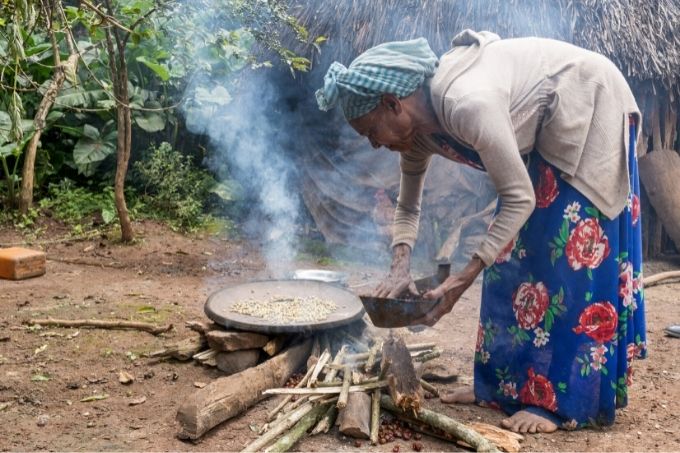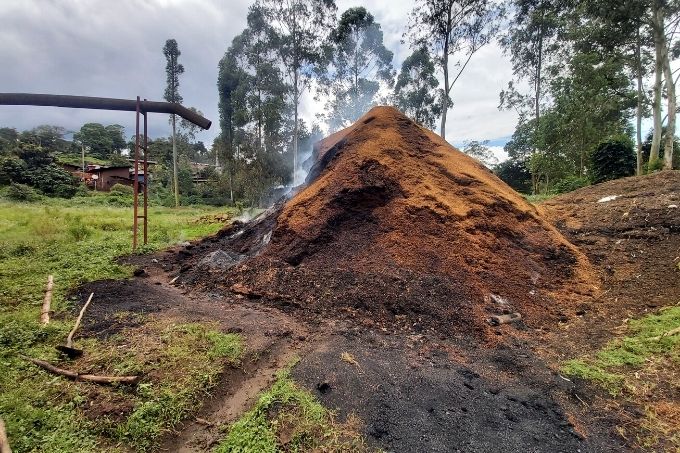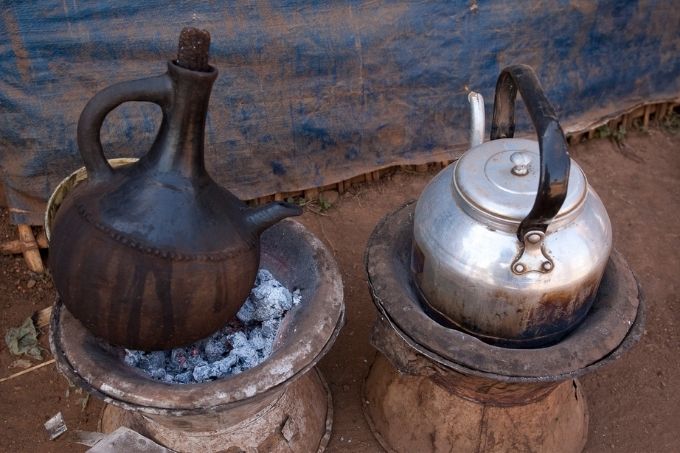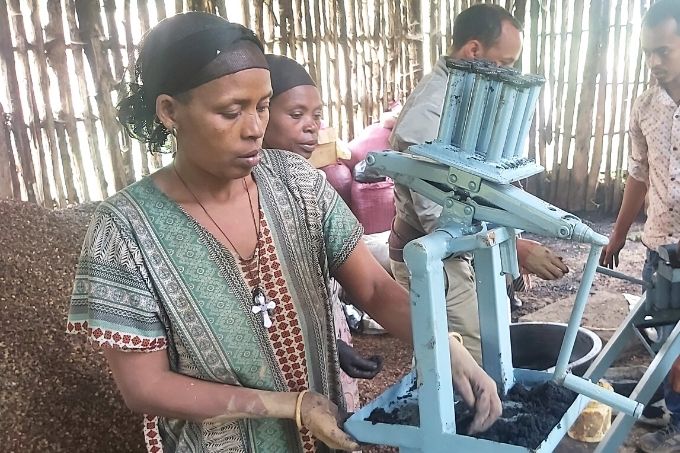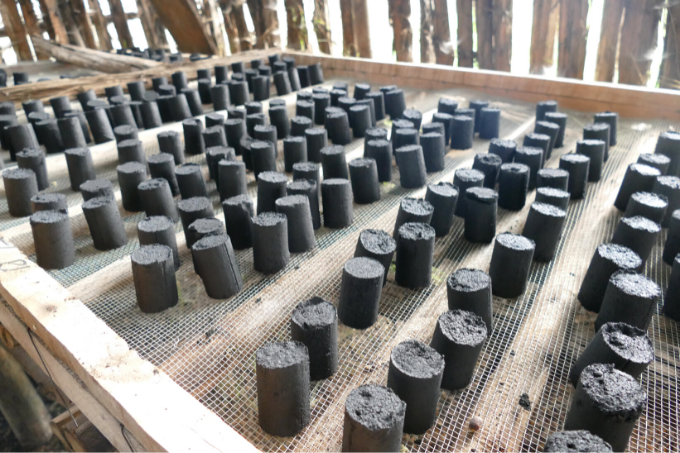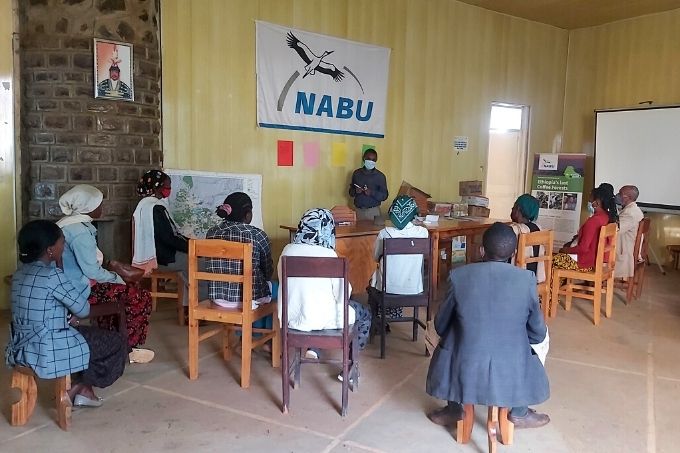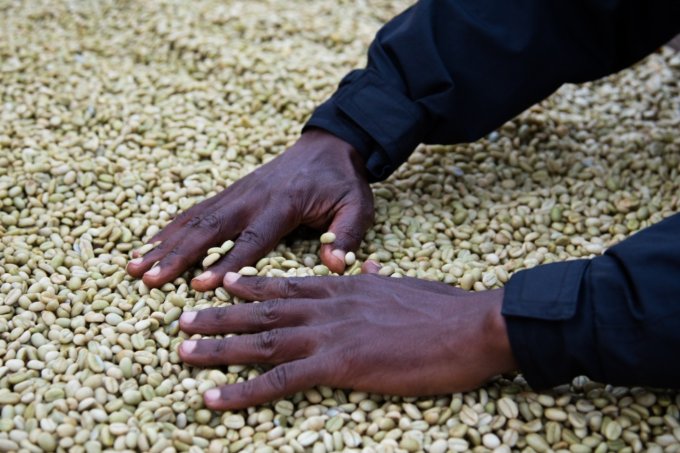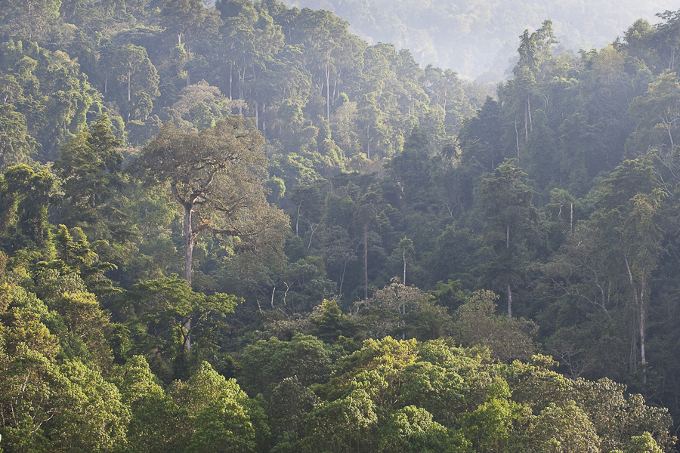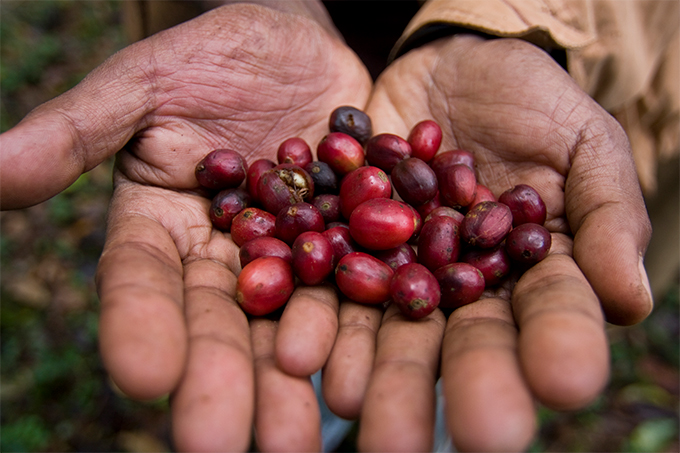Women and Energy
Women for green energy and forest protection in Ethiopia
Ethiopia currently meets 95 percent of its energy demand through biomass. However, the wood and charcoal to produce this energy come from the country's last remaining natural forests. These forests are declining, particularly in rural regions where few alternative energy sources are available. In Bonga Town alone, where NABU’s project office is located, energy production requires the harvest of approximately 71,000 trees per year. The Kafa Biosphere Reserve, the birthplace of Arabica coffee, is especially affected. The daily demand for wood, for example for cooking with traditional stoves and as a fuel source, puts pressure on the ecosystems of the Afromontane cloud forests. The forests, which are vital as carbon sinks, water sources and reservoirs, are increasingly at risk.
In order to preserve the mountain rainforests and secure the energy supply for households in the long term, NABU developed briquettes made from coffee husks - a previously unused waste product from coffee production. The briquettes are an environmentally friendly alternative fuel source and also emit less smoke than charcoal, reducing negative health impacts. This project mainly targeted women, as they are still traditionally responsible for cooking in this area. Local women also often have a low level of education, a lack of opportunities for self-determination and are at a economic and social disadvantage. Women from the Bonga Birhan Tesfa HIV Positive Association, among others, are responsible for promoting the new fuel and were trained accordingly.
The use of coffee husk briquettes is intended to bring about a change in awareness towards long-term forest protection and healthier cooking.
-
Waste materials become recyclable materials: as a byproduct of coffee production, coffee husks pollute groundwater and air if not properly incinerated or stored - photo: NABU
-
Coffee husk briquettes allow environmentally friendly cooking without the need for wood - photo: NABU / Bruno D'Amicis
-
The coffee husks are charred and then pressed into briquettes - photo: NABU
-
After pressing, the coffee husk briquettes are dried before being sold - photo: NABU
-
Through production and sales of briquettes, women in particular are promoted and empowered - photo: NABU
-
These future entrepreneurs are trained by NABU to be able to sell the green energy source professionally on site - photo: NABU
-
The use of sustainable briquettes reduces deforestation and carbon emissions and promotes women's empowerment - photo: NABU
Project facts
Project title
Environmentally aware women for renewable energy and forest protection in Ethiopia's Kafa Biosphere Reserve
Country / Region
Southwest Ethiopia, Kafa Biosphere Reserve
Duration
May 2021 - December 2022
Partners
Kafa Zone Administration, Bonga Birhan Tesfa HIV Positive Association
Sponsored by
Bavarian State Chancellery, NABU
With this project we contributed to the following SDGs
SDG 1, SDG 3, SDG 5, SDG 7, SDG 11, SDG 12, SDG 13
More details
Where do the coffee husks for the briquettes come from?
Dry coffee husks are a byproduct of natural, sun-dried coffee production and are available everywhere in the region due to production of local wild coffee. Before the project, this resource had not been utilised in Bonga and its surrounding areas. The husks were simply burnt on the premises of the processing plants, releasing harmful smoke, greenhouse gases and pollution which entered the groundwater.
With our project, briquettes made of carbonised coffee husks from small family businesses were not only promoted in local and regional markets, but also found their way into everyday businesses of street food vendors, coffeeshops, homesteads and civil society organisations. The family-run businesses that produce the coffee husks have contracts with the Coffee Union in Bonga.
Through creating awareness and changing everyday habits from burning wood to coffee husk briquettes as fuel, NABU contributed to the sustainable development of the region and made Bonga a role model in alternative energy production and waste management.
What are the benefits of using coffee husk briquettes?
Increasing the use of coffee husk briquettes automatically reduces the need to use firewood and thus lessens the anthropogenic pressure on forests. In this way, greenhouse gas emissions and deforestation can be reduced. The project increased awareness around the importance of forest protection and alternative energy sources.
What role did women play in the project?
As in many places on the planet, women are the primary user group interacting with natural resources in Bonga and surrounding areas. Therefore, local women played a key role in promoting coffee husk briquettes and are hence key stakeholders in the introduction of coffee husk briquettes to society.
Beneficiaries were selected based on criteria jointly developed with local stakeholders from civil society, government and traditional social institutions.
136 women received training on environmentally friendly, sustainable and alternative energy usage, business creation and management. 71 women who showed high potential and interest to incorporate the briquettes into a business were selected for extra support to create their own micro-enterprise. Members of the Bonga Birhan Tesfa HIV Positive Association (19 women and 3 men) were selected as promoters of coffee husk briquettes.
What did we achieve with the project?
The project was highly successful, contributing to the strengthening of local (women's) associations and structures, supporting awareness-raising for renewable energy use among more than 8,000 people from all parts of society, and contributing significantly to the implementation of the Ethiopian government's green development strategy (including Climate Resilience and Green Economy Strategy, CRGE). It also supports the fulfilment of national guidelines, especially in the field of environmental and energy policy, which aims at green development with zero carbon emissions by 2030.
During the project period, NABU collaborated intensely with other actors in the region. Bonga's population nowadays is an outstanding example of high acceptance of and demand for briquettes from coffee husks. In other regions, amid similar problems with energy sources and usage, the unfamiliarity of these briquettes have made attempts to use coffee husks as a sustainable energy source difficult.
related topics
NABU promotes sustainable regional development worldwide. Our international projects always include income-generating activities, which comprehensively address all three dimensions of sustainability - balancing economy, ecology and social equality. more →
The last remaining montane cloud forests that contain wild trees of Coffea arabica as a natural part of the ecosystem exist in the Kafa Zone, around Bonga. This is where the Kafa Biosphere Reserve is located. more →
Kafa Biosphere Reserve is challenged by the lack of sustainable employment and innovation for green development and adaptation to the impacts of climate change. The project aims at structuring the up to now non-commercialised garden coffee value chain. more →

